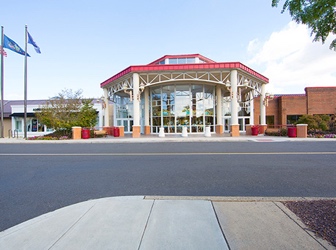Philadelphia — PREIT (OTCQB: PRET), a mall REIT giant based in Philadelphia, has filed for Chapter 11 bankruptcy protection. The “prepackaged” bankruptcy was agreed to ahead of time by PREIT’s creditors, which will shorten the duration of the company’s bankruptcy proceedings. PREIT expects it will be able to emerge from bankruptcy by early February 2024.
PREIT owns and operates 18 malls in New Jersey, Pennsylvania, Massachusetts, Maryland, Virginia, Michigan, North Carolinaand South Carolina. The company has also expanded in recent years to the multifamily, hotel and healthcare sectors.
According to PREIT’s third-quarter financial results, the company’s same-store net operating income declined 5.3 percent year-over-year. Additionally, its total mall occupancy was 93.6 percent, a decrease of 70 basis points from third-quarter 2022.
Joseph Coradino, chairman and CEO of PREIT, cites a trifecta of COVID-19 disruptions, inflation and rising interest rates as leading to its voluntary filing with the U.S. Bankruptcy Court for the District of Delaware.
“Following the pandemic disruption, PREIT has worked tirelessly to enhance the portfolio, dramatically improve occupancy and diversify its tenancy,” says Coradino. “However, unusual economic conditions have limited the company’s options with respect to its debt obligations as meaningful achievements on the operating front were met with inflation and rising interest rates.”
Ahead of its bankruptcy filing, PREIT entered into a restructuring support agreement (RSA) with its first- and second-lien lenders, which have approved the company’s reorganization plan. The initiative is expected to strengthen PREIT’s balance sheet by reducing its total indebtedness by $880 million and extend its maturity runway.
“We are pleased to be moving forward with strengthening the company’s balance sheet and positioning it for long-term success through this prepackaged plan,” says Coradino.
PREIT filed for bankruptcy in November 2020 before emerging a month later. In 2021, PREIT enlisted financial advisory firm PJT Partners LP to explore value creation strategies, including selling existing real estate and seeking capital partners. That same year, the company relinquished control of the Fashion District Philadelphia development in Center City after its development partner, Macerich, paid down $100 million in construction debt to Wells Fargo.
According to Michael DeMarco, lead independent trustee of PREIT’s board of trustees, the various strategies were not enough to overcome the loan amounts owed to PREIT’s first- and second-lien lenders.
The Chapter 11 bankruptcy is a measure advised by PJT Partners to maximize value for its existing shareholders and shape the company for the future.
Future of PREIT
PREIT will no longer be publicly traded, and all of its existing preferred and common shares will be canceled. An aggregate $10 million payment will be provided to its shareholders subject to certain “equity distribution conditions” that were not outlined by PREIT in its release.
PREIT’s stock closed on Monday, Dec. 11 at 43 cents per share, down from $2.56 a year ago. Five years ago, PREIT’s stock price stood at $114.75 when it traded on the New York Stock Exchange.
As part of PREIT’s restructuring, the company is selling its stake in Fashion District Philadelphia to Macerich, according to The Philadelphia Inquirer.
Despite the bankruptcy filing, there have been some positive signs for the company. In the third quarter, PREIT executed leases at its various malls totaling 186,000 square feet. The company also celebrated the opening of LEGO Discovery Center at Springfield Town Center in Northern Virginia in August and a new Ulta Beauty store at Dartmouth Mall in Massachusetts in November.
Other recent deals include a Burlington store at Springfield Town Center, Tilted 10 at Willow Grove Park in Pennsylvania and Dick’s House of Sport at Viewmont Mall in Scranton, Pennsylvania.
PREIT is also actively repositioning underutilized spaces across its portfolio. The company recently opened a new self-storage facility on a below-grade space at Mall at Prince George’s in Hyattsville, Maryland. PREIT also opened the new Cooper University Healthcare Facility and 375-unit Pearl apartment community at Moorestown Mall in New Jersey.
The company also plans to sell parcels at Springfield Town Center following the successful rezoning for 460 apartments and a new hotel on the site.
Additionally, PREIT recently sold a store at Plymouth Meeting Mall in Pennsylvania leased to Whole Foods Market, as well as land to entertainment venue operator Main Event at Woodland Mall in Grand Rapids, Michigan.
Financial terms and commitments
To facilitate the reorganization, PREIT has received commitments for debtor-in-possession (DIP) financing and exit revolver financing from an investment group led by Redwood Capital Management LLC and Nut Tree Capital Management LP. The financing package totals approximately $135 million. PREIT expects to pay all vendors, suppliers and employees during the course of the Chapter 11 proceedings.
PREIT’s lenders have committed to provide revolving loans and term loans under an exit facility that consists of a $75 million new money revolver in the event that PREIT emerges from the bankruptcy proceedings with less than $75 million in unrestricted cash.
The DIP facility will total up to $60 million and will convert to term loans under the exit facility in an amount equal to 101 percent of the DIP facility loans.
As part of the RSA with its first- and second-lien lenders, PREIT’s first-lien lenders have the option to receive either a cash payment equal to 100 percent of their claims, or instead convert their claims into term loans under the exit facility in an amount equal to 101 percent of their claims.
Second-lien lenders will get their pro rata share of 65 percent of the new equity interests in the reorganized PREIT, and lenders who commit to “backstop” the exit facility will receive 35 percent of the new equity interests in the reorganized PREIT.
“We look forward to quickly emerging from this process as a financially stronger company with the resources and support to continue creating diverse, multi-use property experiences throughout our portfolio,” says Coradino.
— John Nelson


